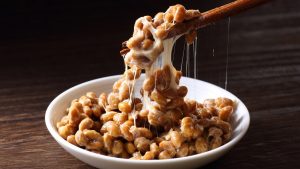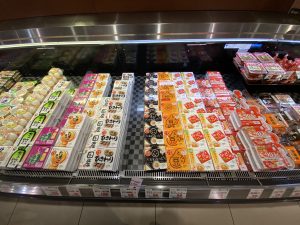 Natto is unknown in the west, but very popular in Japan. Natto is a traditional food made from fermenting soybeans. It is commonly mixed with karashi (mustard), soy sauce and sometimes chopped onions, and served over white rice at breakfast. It is an acquired taste because of the powerful smell, strong flavor and sticky, slimy texture. But in a recent survey, more than 70% of Japanese people found the taste pleasant. But many others who did not find the taste pleasant still ate it for its health benefits. I first tried Natto many years ago. My exact description was “disgusting”. It took me many years before I tried it again, and again my description was “disgusting”. But then, several years ago, I tried it again, and I liked it. Now, when I am in Japan, I eat it almost every day.
Natto is unknown in the west, but very popular in Japan. Natto is a traditional food made from fermenting soybeans. It is commonly mixed with karashi (mustard), soy sauce and sometimes chopped onions, and served over white rice at breakfast. It is an acquired taste because of the powerful smell, strong flavor and sticky, slimy texture. But in a recent survey, more than 70% of Japanese people found the taste pleasant. But many others who did not find the taste pleasant still ate it for its health benefits. I first tried Natto many years ago. My exact description was “disgusting”. It took me many years before I tried it again, and again my description was “disgusting”. But then, several years ago, I tried it again, and I liked it. Now, when I am in Japan, I eat it almost every day.

It is Flexible
The Japanese are always finding ways of combining the old and the new, especially when it comes to food. I have seen many different recipes using it in new and different ways. I have created dishes with sushi-grade tuna, avocado and Natto, Natto spaghetti, Natto, bacon and cheese rice bowls and an open-faced Natto omelette. But here is a super-simple easy recipe to make Natto salad dressing I have found.- 2 packs Hikiwari Natto (chopped Natto)
- 2 tbsp ponzu sauce
- 1 tbsp olive oil
Why Natto Is Super Healthy and Nutritious
Natto is super nutritious. It contains high levels of many nutrients that are important for optimal health. A 3.5-ounce (100-gram) portion provides the following:- Calories: 212
- Fat: 11 grams
- Carbs: 14 grams
- Fiber: 5 grams
- Protein: 18 grams
- Manganese: 76% of the RDI
- Iron: 48% of the RDI
- Copper: 33% of the RDI
- Vitamin K1: 29% of the RDI
- Magnesium: 29% of the RDI
- Calcium: 22% of the RDI
- Vitamin C: 22% of the RDI
- Potassium: 21% of the RDI
- Zinc: 20% of the RDI
- Selenium: 13% of the RDI
Improves Your Digestion
It is made by fermenting soybeans, which creates conditions that promote the growth of probiotics. Probiotics are beneficial bacteria that provide a wide range of health benefits. One such benefit includes making foods more digestible, making it easier for your body to absorb nutrients.Contributes to Stronger Bones
It is rich in several nutrients that contribute to healthy bones. To start, a 3.5-ounce (100-gram) portion of natto provides 22% of the recommended daily intake (RDI) of calcium. In addition, natto is one of the rare plant sources of vitamin K2. Vitamin K2 plays an essential role in bone health by activating bone-building proteins that help bring calcium into your bones and keep it there.Promotes Heart Health
It may also contribute to a healthier heart. That’s partly because it contains fiber and probiotics, both of which can help reduce cholesterol levels. Furthermore, natto fermentation produces nattokinase, a type of enzyme that helps dissolve blood clots. Moreover, Japanese researchers report that natto may help lower blood pressure by inactivating angiotensin converting enzyme (ACE), which helps control blood pressure. In fact, several studies show that nattokinase supplements reduced blood pressure by around 3–5.5 mmHg in participants with initial blood pressure values of 130/90 mmHg or higher.May Strengthen Your Immune System
It contains several nutrients that may help strengthen your immune system. To begin with, probiotic-rich foods such as natto contribute to a healthy gut flora. In turn, a healthy gut flora helps prevent the growth of harmful bacteria and may even boost your production of natural antibodies. Moreover, probiotics further reduce the risk of infection and may help you recover faster if you do get sick. What’s more, a probiotic-rich diet may also reduce the likelihood of needing antibiotics to recover from an infection by around 33%.Other Potential Benefits
Regularly eating natto may provide several other benefits:- Reduce the risk of certain cancers: it contains soy isoflavones and vitamin K2, both of which may be linked to a lower risk of liver, prostate, digestive and breast cancer.
- Help you lose weight: it contains good amounts of probiotics and fiber, both of which may play a role in preventing weight gain and optimizing weight loss
- Improve brain health: Probiotic-rich foods such as natto may help reduce stress, improve memory, and reduce symptoms of anxiety, depression, autism and obsessive-compulsive disorder (OCD).





